2024 was both a busy year and a tough year for me. Although I did not read as much as in some previous years, there are several books I did read that are worthy of mention and recommendation.
Here are my top seven reads of 2024, listed in the order in which I read them. (Note: Only one of the books was published in 2024. The rest of the books have publishing dates between 2010 and 2023.)
1. The Crow Valley Karaoke Championships by Ali Bryan
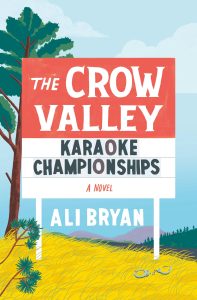
The Crow Valley Karaoke Championships, published in 2023 by Henry Holt and Co., takes place over one day, that of a high-stakes karaoke competition in the town of Crow Valley where the champion will go on to the Nationals. This is a year after forest fires ravaged the town and claimed the life of Dale Jepson, who was a karaoke legend, local prison guard, and all-round good guy. The story is told from alternating points of view of five characters who had a connection with Dale. Having many points of view can be a tricky thing in a novel, but it works well here. Each voice is distinct.
The characters are quirky and even absurd, but they also seem strangely realistic and relatable. Dale’s widow Roxanne keeps an urn with Dale’s ashes with her. Dale’s best friend Brett strives to perform a suitable tribute song for Dale and is trying to win back his wife. Brett’s wife is a prison guard struggling to remain sober. Molly’s desperate attempts to become a karaoke star and prove she is more than just a mother may be a little over the top. In the middle of all of this, a convicted arsonist escapes from the nearby prison.
There is a line of sadness running through the book, but there is also a lot of humour. It is fast-paced. I think the last line of a book review on Kirkus does a good job of summing up the book: “A surprising, darkly comic look at people dealing with tragedy and choosing to sing anyway.”
2. Akin by Emma Donoghue
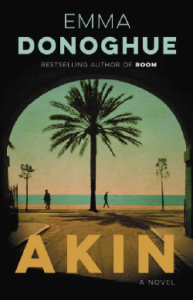
Akin, published in 2019 by HarperCollins Canada (and by Little, Brown, and Company in the United States), is the story of an old man and a boy who are thrown together by circumstance and a family connection, although they’ve never met. Noah Selvaggio is a retired chemistry professor and widower living on the Upper West Side, but born in the South of France. He is days away from his first visit back to Nice since he was a child, bringing with him a handful of puzzling photos he’s discovered from his mother’s wartime years. But he receives a call from social services: Noah is the closest available relative of an eleven-year-old great-nephew he’s never met, who urgently needs someone to look after him. Out of a feeling of obligation, Noah agrees to take Michael along on his trip.
The two agree on very little and constantly bicker. As they go on Noah’s quest to unearth troubling details about their family’s past, they deal with the culture shock of being in a foreign country and the generational divide between them. Their reactions to the different culture and the generational differences cause some humorous moments. Over time, they grow closer and come to appreciate each other. And the reader learns more about the painful pasts of both of them. Their characters are well-developed and feel very feel. Although I feel the solution to the riddle of the puzzling photographs comes about in a way that seemed a little too pat to be realistic, overall this is a very satisfying read.
Emma Donaghue is an award-winning Irish writer living in Canada. She is best known for her novel Room. Her novel The Pull of the Stars was one of the top picks on my 2021 Reading List. I have also read and enjoyed her book The Wonder.
3. Wînipêk: Visions of Canada from an Indigenous Centre by Niigaan Sinclair
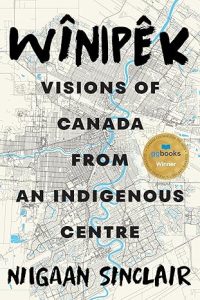
Wînipêk: Visions of Canada from an Indigenous Centre is a collection of essays by Niigaan Sinclair that illuminate the reality of Indigenous life in Canada. The essays, published by Penguin Random House Canada in 2024, focus on current day people, experiences, and events. They highlight the racism and inequalities affecting Indigenous peoples and the devastating effects, still felt today, of colonialism and the Indian Act. They also showcase positive changes and reasons for hope. Many of the pieces draw from Sinclair’s own personal experiences and his family. They are told with a mixture of indignation, outrage, reverence, humour, love, hope, and a call to action.
Sinclair is Anishinaabe (St. Peter’s/Little Pequis), a professor at the University of Manitoba Department of Indigenous Studies, a writer, and a commentator on Indigenous issues. He is a regular columnist with the Free Press in Winnipeg, Manitoba, Canada. He is also the son of Murray Sinclair, who was a First Nations lawyer, the first Indigenous judge in Manitoba, a Canadian Senator, and Chair of Canada’s Indian Residential Schools Truth and Reconciliation Commission.
The essays cover a broad range of topics. Although they sometimes touch on the historical context, the focus is on the current day and how we can shape the future. Together, they provide a multi-faceted picture of the present-day Indigenous experience. Many of the essays are firmly rooted in Winnipeg, but also speak to the Indigenous experience across Canada. Sinclair says that Winnipeg has been at the centre of Indigenous and non-Indigenous relationships on Turtle Island (North America) for centuries. Today, Winnipeg has the highest percentage of Indigenous Peoples in the country outside of the northern territories. He calls it “ground zero” of Reconciliation in Canada.
Wînipêk: Visions of Canada from an Indigenous Centre won the 2024 Governor General’s Literary Award for Nonfiction, was named Best Book of 2024 by Audible, Spotify, and Winnipeg Free Press, and was one of CBC’s Best Canadian Nonfiction of 2024.
I wrote a longer review here.
4. Peace by Chocolate: The Hadhad Family’s Remarkable Journey from Syria to Canada by Jon Tattrie
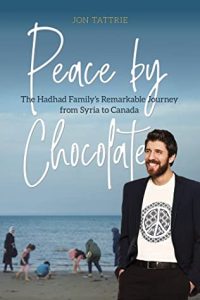
Peace by Chocolate, published in 2020 by Goose Lane Editions, tells the extraordinary story of the Hadhad family. The Hadhad family were chocolate makers in Syria for over 30 years selling their specialty treats all over the Middle East and Europe. In 2012, their chocolate factory was destroyed in a bombing that forced the family to flee to Lebanon. They lived as refugees for three years before coming to Canada. With the support of their new community of Antigonish and the people of Nova Scotia, they rebuilt their chocolate factory. They named it Peace by Chocolate and marketed it with the slogan “One Peace Won’t Hurt.” In addition to their original Antigonish store, they now also have a store in Halifax, Nova Scotia. Their products can be found in specialty stores across Canada and in some parts of the United States.
Jon Tattrie is an award-winning author and multi-media journalist. He starts the book by depicting the life of the family before civil war hit their country. Their story illustrates the devastation caused by that war. The book is relatively short and is a heart-warming read about the family rebuilding their lives and about the people of Antigonish, Nova Scotia, and so many towns across Canada, who welcomed strangers and helped them face the challenges of settling in an unfamiliar land.
5. Foster by Claire Keegan
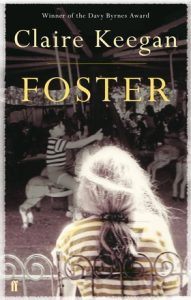
Foster, published in 2010 by Faber & Faber, is classified as a novella or a long short story. A small girl is sent to live with foster parents on a farm in rural Ireland, without knowing when she will return home. In the strangers’ house, she finds a warmth and affection she has not known before and slowly begins to blossom in their care. And then a secret is revealed and suddenly, she realizes how fragile her idyll is.
It is an emotional tale that contains both sadness and heart-warming moments. Like most short stories, there is a lot said between the lines, in the words not written.
Claire Keegan is an Irish writer known for her short stories. Foster was adapted into a movie, The Quiet Girl, in 2022.
6. The Sleeping Car Porter by Suzette Mayr
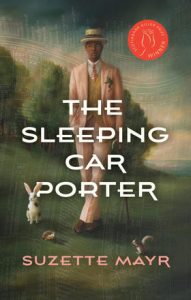
The Sleeping Car Porter, published in 2022 by Coach House Books, brings to life a time in North American history when black men worked as sleeping car porters, one of the few jobs available to them. Set in 1929, it follows Baxter, a queer sleeping car porter, on a trip west across Canada.
The book does a good job of portraying the world of sleeping car porters. It wasn’t easy. They were on call all the time. Sleep-deprived Baxter has hallucinations. The porters could easily get demerit points that threatened their jobs. So, when passengers call Baxter George, he smiles, nods, and acts invisible. What he really wants is to go to dentistry school, but he needs to save up a lot of nickel and dime tips for that to happen.
I have to admit I did not like this book when I started it. It seemed to have no plot and simply described what was going on in the moving train. I found Mayr’s constant use of metaphoric action verbs jarring, although that became less so as I got further into the book. I didn’t get a good sense of Baxter’s character initially. It took a while for him to become more real to me. If I hadn’t been reading the book as a book club selection, I might have given up. I am glad I kept going. I was almost halfway through the book (it isn’t a long book) before I was hooked and couldn’t put it down.
By then, I knew more about Baxter and cared what happened to him. The other passengers on the train are also interesting as bit by bit we learn about their different lives. We learn a lot more when the train stalls for two days because of a mudslide not far from Banff. I found the ending very satisfying and much of the book has stayed with me since.
The book won the 2022 Scotiabank Giller Prize, the 2023 Georges Bugnet Award for Fiction, and the City of Calgary W.O. Mitchell Book Prize. It was shortlisted for a number of other awards, including the 2023 Governor General’s Award for English-Language Fiction, and listed in several best books lists.
7. Black Water: family, legacy, and blood memory by David A. Robertson
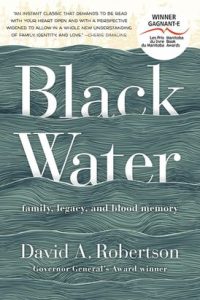
Black Water, published by HarperCollins Canada in 2020, is a memoir structured around a father-son journey to a northern trapline where they reclaim their connection to the land. It is also about the journey of a young man seeking to understand his father’s story, come to terms with his lifelong experience of anxiety, and piece together his own identity.
David A. Robinson is a two-time Governor General’s Literary Award winner and has won the Children’s Literature Award and the Writer’s Union of Canada Freedom to Read award. He has received several other accolades for his work as a writer for children and adults, podcaster, public speaker, and social advocate.
The son of a Cree father and a non-Indigenous mother, Robinson grew up with virtually no knowledge or understanding of his family’s Indigenous roots. His parents separated when he was very young. Although he did have contact with his father during that time and his parents reunited about a decade later, he felt his father’s absence more than his presence. His father also traveled a lot for work.
His father Don spent his early childhood on a trapline in the bush northeast of Norway House, Manitoba. His family was moved permanently to a nearby reserve where he was not permitted to speak Cree at school. Don’s desire to pay one last visit to the trapline becomes the vehicle through which Robertson tells the story of both his father’s life and his own journey to learn about his Indigenous identity. In some ways, it feels like a tribute to his father.
The book is well-written and keeps one’s interest as the stories of their lives unfold.

Be First to Comment